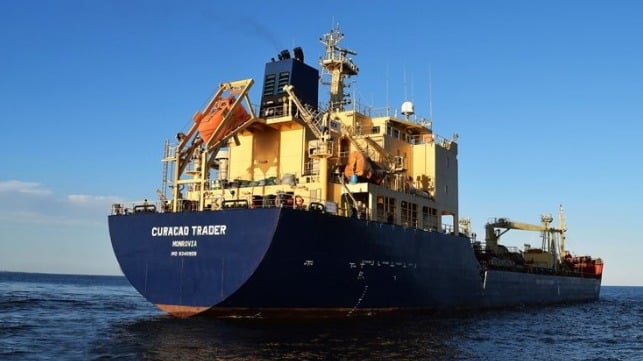Gulf of Guinea Pirates Extend Their Reach Far from Shore

Days after the ICC International Maritime Bureau cited the Gulf of Guinea off West Africa as being the most dangerous for commercial shipping, reports of a new kidnapping are surfacing in the region. The new incident is the furthest offshore act of piracy yet recorded in the area according to Dryad Global.
Despite the use of speedboats, based on the location Dryad speculates that the perpetrators are being supported by a larger mother vessel, allowing them to sustain deep offshore operations beyond state counter-piracy efforts.
Dryad is reporting that the 11,321 DWT Liberian-flagged product tanker Curacao Trader was boarded 244 nautical miles south Cotonou, Benin, and south-southwest of Nigeria. Apparently, 15 Russian and Ukrainian seafarers have been kidnapped.
According to their analysis of the situation, the vessel departed Lome in Togo sailing south when it was approached by eight armed individuals who boarded the product tanker. Dryad is reporting that the vessel’s speed dropped to 3 knots at the time of the attack. The vessel was later reported drifting with its status on AIS showing as “Not under Command.” It was later reported to be proceeding at 10 knots.
This is the third incident being reported this month in the Gulf of Guinea with five crew members kidnapped at the beginning of July from the general cargo vessel Kota Budi. Nine were also kidnapped from the FPSO Sendje Berge in the oil fields off Nigeria.

that matters most
Get the latest maritime news delivered to your inbox daily.
The IMB’s Piracy Reporting Centre recorded 98 incidents of piracy and armed robbery in the first half of 2020, saying that the Gulf of Guinea accounted for over 90 percent of the maritime kidnappings worldwide.
Dryad reports that this latest incident brings to 93 the total number of crew kidnappings in the Gulf of Guinea. The number of people kidnapped in maritime incidents is currently tracking at a 47 percent increase compared to 2019.
